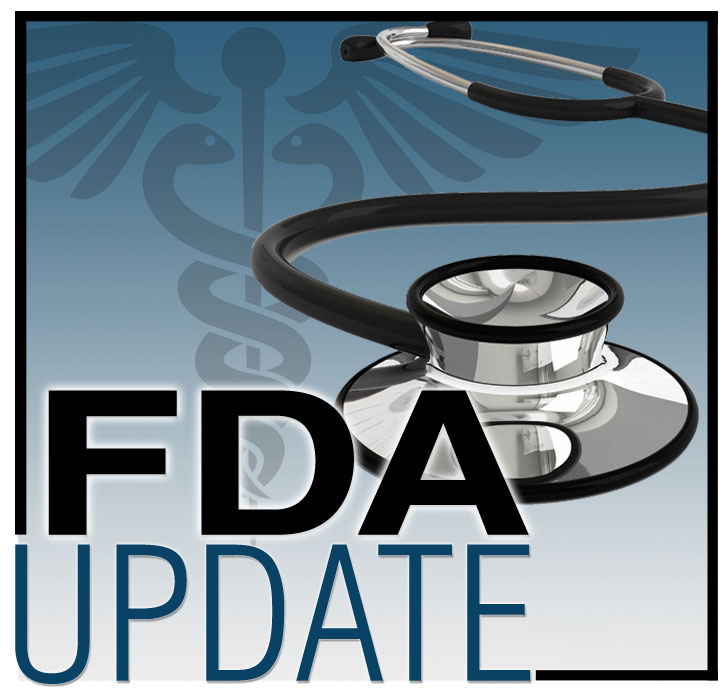FDA Approves Midostaurin for FLT3-Positive Adult AML, Advanced Systemic Mastocytosis

On April 28, 2017, the U.S. Food and Drug Administration (FDA) approved midostaurin for the treatment of adult patients with newly diagnosed acute myeloid leukemia (AML) who are FLT3 mutation-positive (FLT3+), as detected by an FDA-approved test, in combination with standard cytarabine and daunorubicin induction and cytarabine consolidation.
The FDA also approved a companion diagnostic, the LeukoStrat CDx FLT3 Mutation Assay, for use with midostaurin to test patients with AML for the FLT3 mutation.
Approval was based on a randomized, double-blind, placebo-controlled trial in 717 patients with previously untreated FLT3+ AML. This trial randomized patients to either placebo or midostaurin 50 mg orally twice daily on days 8–21 of each cycle of induction and consolidation chemotherapy followed by continuous daily midostaurin for up to 12 cycles. The trial demonstrated a statistically significant improvement in overall survival for patients receiving midostaurin compared with those on the placebo-containing arm (HR = 0.77, p = 0.016).
Common adverse reactions, occurring in at least 20% of patients, included febrile neutropenia, nausea, mucositis, vomiting, headache, petechiae, musculoskeletal pain, epistaxis, device-related infection, hyperglycemia, and upper-respiratory tract infection. The most frequent serious adverse reaction was febrile neutropenia, occurring in 16% of patients on both arms.
FDA also approved midostaurin for the treatment of adults with aggressive systemic mastocytosis (SM), SM with associated hematological neoplasm, or mast cell leukemia. Approval was based on response rate and duration in a single-arm, open-label study of midostaurin 100 mg orally twice daily. With six cycles of midostaurin, the rates of confirmed complete remission (CR) plus incomplete remission by modified Valent criteria were 38% for ASM and 16% for SM-AHN. One patient (5%) with mast cell leukemia achieved a CR. The most common adverse reactions included nausea, vomiting, diarrhea, edema, musculoskeletal pain, abdominal pain, fatigue, upper respiratory tract infection, fever, headache, and dyspnea.
The recommended dose of midostaurin in AML is 50 mg twice daily with food on days 8–21 of each cycle of induction and consolidation chemotherapy followed by 50 mg with food as a single agent for up to 12 months. The recommended dose for the treatment of adults with aggressive systemic mastocytosis (SM), SM with associated hematological neoplasm, or mast cell leukemia is 100 mg twice daily with food.
Full prescribing information is available (https://www.accessdata.fda.gov/drugsatfda_docs/label/2017/207997s000lbl.pdf).
FDA granted this application Breakthrough Therapy Designation (in AML), Fast Track Designation (in SM), and priority review. A description of FDA expedited programs is in the Guidance for Industry: Expedited Programs for Serious Conditions-Drugs and Biologics (http://www.fda.gov/downloads/drugs/guidancecomplianceregulatoryinformation/guidances/ucm358301.pdf).
Healthcare professionals should report all serious adverse events suspected to be associated with the use of any medicine and device to FDA’s MedWatch Reporting System by completing a form online (http://www.fda.gov/medwatch/report.htm), by faxing (800-FDA-0178) or mailing the postage-paid address form provided online, or by telephone (800-FDA-1088).
In collaboration with the FDA and as a service to our members, ONS provides updates on recent FDA approvals and other important FDA actions (e.g., updated safety information, new prescribing information) pertaining to therapies for patients with cancer. This allows the agency to inform oncologists and professionals in oncology-related fields in a timely manner. Included in the FDA updates is a link to the product label or to other sites for additional relevant clinical information. In supplying this information, ONS does not endorse any product or therapy and does not take any position on the safety or efficacy of the product or therapy described.
